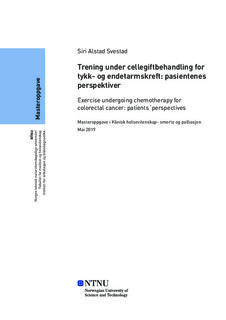| dc.contributor.advisor | Skolbekken, John-Arne | |
| dc.contributor.author | Svestad, Siri Alstad | |
| dc.date.accessioned | 2019-09-22T14:00:42Z | |
| dc.date.available | 2019-09-22T14:00:42Z | |
| dc.date.issued | 2019 | |
| dc.identifier.uri | http://hdl.handle.net/11250/2618114 | |
| dc.description.abstract | Bakgrunn: Primærbehandlingen for tykk- og endetarmskreft er kirurgi, men cellegift gis avhengig av sykdomsutbredelse for å bedre overlevelse. Sykdom og behandling medfører bivirkninger som blant annet fatigue og sensorisk nevropati, som igjen kan medføre endret behandlingsprotokoll og også tap av livskvalitet. Studier har vist at trening ved kreftsykdom er gjennomførbart, øker styrke, utholdenhet, og fysisk funksjon, bedrer gjennomføringsgrad av cellegiftbehandling, og at trening oppleves som meningsfullt både fysisk, psykisk og sosialt. Universitetssykehuset St.Olavs hospital gjennomfører en pilot hvor pasienter trener under adjuvant cellegiftbehandling for tykk- og endetarmskreft.
Hensikt: Hensikten med dette prosjektet er å undersøke hvilke erfaringer deltagerne har ved individuelt veiledet trening under adjuvant cellegiftbehandling for tykk- og endetarmskreft.
Metode: Semistrukturerte intervju ble gjennomført med åtte deltagere i pilotprosjektet ved tre tidspunkt i behandlingsforløpet: baseline, tre måneder og seks måneder. Analyser ble gjort ved Malteruds systematiske tekstkondensering.
Resultater: Fire hovedkategorier ble identifisert: 1) trening, 2) utfordringer og bekymringer, 3) hverdagsliv og 4) håndtering.
Konklusjon: Pasienter under adjuvant cellegiftbehandling for KRK kan delta i treningsintervensjon til tross for moderate bivirkninger, og de verdsatte veiledning av fysioterapeut men kompetanse innen kreftrehabilitering | |
| dc.description.abstract | Background: Surgery is standard treatment for colorectal cancer (CRC) and dependent on the extent of the disease, chemotherapy is prescribed to improve survival rates. Many patients with CRC experience side effects like fatigue and peripheral neuropathy, which can lead to delays and disruptions of the cancer treatment and have an impact on the quality of life of patients. Research show that exercise while undergoing cancer treatment is feasible and it increases strength, endurance and physical function, improves chemotherapy completion rate, and experienced as meaningful, both physically, mentally and socially by patients. St. Olavs hospital, Trondheim University Hospital, are conducting a pilot study where patients with CRC exercise while undergoing adjuvant chemotherapy treatment.
Purpose: The aim of this study is to investigate the participants’ experiences while participating in an individually supervised exercise program during adjuvant chemotherapy.
Method: Semi-structured interviews were completed with eight participants from the pilot study at three points in the course of intervention: baseline, three months and six months. Data were analysed by using Malterud`s Systematic Text Condensation (STC).
Results: Four main categories were identified: 1) exercise, 2) challenges and worries, 3) everyday life and 4) coping.
Conclusion: Patients with CRC undergoing adjuvant chemotherapy are able to participate in an exercise intervention despite moderate side effects and appreciated the supervision of a physiotherapist with specialised competence in cancer rehabilitation | |
| dc.language | nob | |
| dc.publisher | NTNU | |
| dc.title | Trening under cellegiftsbehandling for tykk- og endetarmskreft: pasientenes erfaringer | |
| dc.type | Master thesis | |
